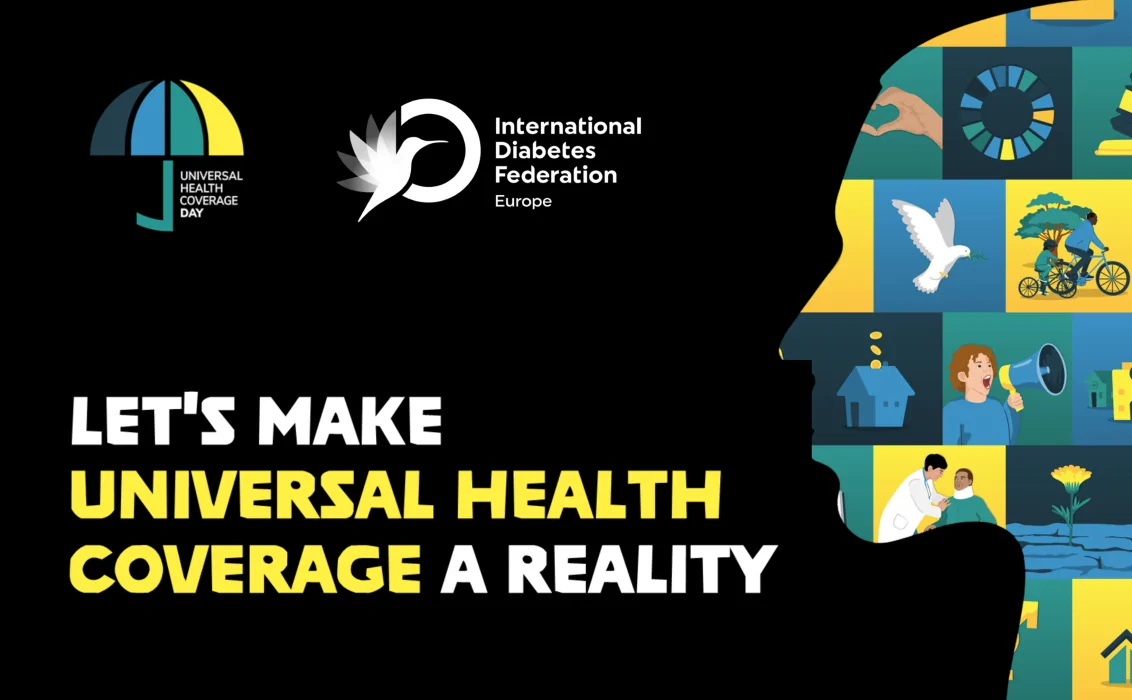Ageing population: Opportunities
Today we live longer and healthier lives than generations before us. This presents both opportunities and challenges for our society and raises questions on how to develop EU policies and strategies that meet the demands associated with this demographic change. As the number of people over 65 will substantially increase over the coming decades, the EU needs to prioritise initiatives that ensure these people remain healthy and active. At the International Diabetes Federation Europe (IDF Europe), an umbrella organisation representing 70 national diabetes organisations in 44 countries across Europe, we believe that an ageing population holds considerable potential for Europe, and we welcome the Green Paper on Ageing.
By promoting the importance of health and well-being from an early age and throughout the life course and providing health-enabling environments, we can create conditions for a healthy ageing population. This demographic group can contribute to economic growth by partaking in employment programmes longer, acquiring and maintaining necessary qualifications and competencies, and training younger workers. On top of employment, older people are frequently involved in civic engagement and a number of volunteering activities that bring together people of different backgrounds and age groups. Connecting generations will also lead to positive impacts on communities and society as a whole.
Diabetes and the geriatric population: Key challenges
Promoting health is a political choice and we need to strengthen our health promotion capacity to avoid severe health complications among older populations, resulting from Type 2 diabetes and other non-communicable diseases (NCDs). The elderly are the age group with the highest prevalence of Type 2 diabetes and the fastest-growing segment of the population.1 Type 2 diabetes develops as a result of unmodifiable genetic, physiological, environmental and modifiable, risk factors such as age, lack of physical activity and poor nutrition. The prevalence of diabetes in people over 65 is double that for people under 65 and ageing can make diabetes more difficult to manage due to increased insulin resistance, for example. Moreover, management of older adults living with diabetes is more complicated, given they often have multiple coexisting clinical conditions and there is a link between diabetes and cognitive dysfunction, with Type 2 diabetes associated with an increased risk of dementia.2 Overall, diabetes and its complications reduce life expectancy by up to 10-15 years and jeopardise healthy ageing, thus negatively affecting the EU’s economic and social productivity, and causing unsustainable health expenditure. In 2019, diabetes accounted for 9% of the direct health expenditure in the EU, with the cost of mostly preventable complications, accounting for 75% of the expenses.
What can be done?
For older people living with diabetes (PwD) and other NCDs, such as cancer, cardiovascular diseases, and chronic respiratory diseases, to be active participants in economic and social life, the following actions must be implemented:
Risk reduction programmes: Reducing the risk of developing Type 2 diabetes and diabetes-related complications for all types of diabetes is a key step towards ensuring a better quality of life for older adults. Diabetes is a complex and multi-faceted condition (14 disease types, with distinct onset mechanism, facilitated by various risk factors). It is a life-long condition, that can start very early in life (Type 1 diabetes often develops in children and younger adults). The longer the person lives with diabetes, the higher the risk of developing serious and expensive complications that have an immense impact on the quality of life of PwD and that of their families.
Reducing the risk of diabetes can be done by raising awareness of the condition and improving knowledge to help eradicate stigma and discrimination. Risk reduction can also be achieved through policies that support health-enabling environments, tackle social and health inequalities and promote early action, such as early diagnosis and initiation of treatment.
Engaging the elderly around all decisions around their care: Diabetes imposes a significant morbidity, mortality, and economic burden on older adults. EU policy actions are needed that engage the elderly living with diabetes in all decisions relating to their diabetes care. This includes, for example, engaging meaningfully with them at all stages of programme and policy developments as they know what matters most to them and what their unmet needs are. All policies and initiatives should be person-centred, involving PwD during consultation processes including the definition and implementation of new work programmes, policies and other initiatives.
Diabetes technology and digital tools: Diabetes requires 24/7 management. It is critical to ensure that older adults have the right tools to facilitate their self-management and that their care suits them. For those adults who use diabetes technology to manage their condition, for example, using glucose meters for self-monitoring or continuous glucose monitoring systems, it is essential that they are properly supported in understanding their use, that the tools are adapted to their needs (e.g. customisable displays or voice over-options for the visually impaired or simplified menus for the cognitively challenged)3 and that the tools are accessible and affordable. For those older adults that become cognitively impaired and are no longer able to manage by themselves such heavy yet necessary tasks as monitoring blood glucose, determining correct insulin doses, carbohydrate counting, and meal planning, alternative models of care should be put in place and innovation should encourage the development of tools that do not require user interaction.
Improved education and support for healthcare professionals: There is currently a lack of diabetes specialists involved in the treatment and care of older adults in hospitals and care homes across Europe. Additionally, the use of technology sometimes gets discontinued on the grounds of advanced age.4 Investment in well-resourced healthcare teams, supported by specific training in managing the needs of older people living with diabetes is critically required. Improving education and support for healthcare professionals will also enhance their digital literacy and clinical expertise which are crucial for the individualisation of treatments and effective use of digital devices.
Research on diabetes in older adults: Expanding research studies that focus on diabetes among older people is crucial to enhancing treatments for this age group. COVID-19 has highlighted the vital role health plays in ensuring the European Union’s economic sustainability and competitiveness. Research is the cornerstone of future improvements in diabetes prevention and management and in light of the recent pandemic and the burden of diabetes across Europe, it must be strengthened. A number of gaps currently exist in research focused on diabetes in older adults. Older participants are excluded from randomised control trials of diabetes interventions, meaning that treatments may not be adapted to this age group. Including the participation of older population segments in all key EU-funded research programmes should be encouraged.
Conclusion
New policies and initiatives are needed to guarantee a healthy and active ageing European population and reduce the burden placed by diabetes on healthcare systems’ finances, staffing and other resources. Health-in-all policies should guide the EU’s approach. Patient-centred and outcome-based policy efforts must be developed to improve the quality of life of older adults with diabetes and give them an opportunity to remain active participants in the socio-economic sphere. This can be achieved through investments in risk reduction programmes, engaging older adults in all decisions around their care, providing them with digital tools that are customised to their individual health conditions, providing education and training to healthcare professionals and including PwD in research on treatments and most effective care.
Footnotes:
- Kalyani R., Golden S. H. and Cefalu W. T. (2017). Diabetes and aging: Unique considerations and goals of care, 40 (4), 440-443. https://doi.org/10.2337/dci17-0005
- Srikanth V., Sinclair A. J., Hill-Briggs F., Moran C., Biessels J. G. (2020). Type 2 diabetes and cognitive dysfunction—towards effective management of both comorbidities, 8(6), 535-545. DOI:https://doi.org/10.1016/S2213-8587(20)30118-2
- Heinemann L., Klonoff, D. and Kubiak T. (2019). Elderly patients with Diabetes: special aspects to consider, 13(4), 611-613. https://doi.org/10.1177/1932296819833862
- Sinclair A. J., Gadsby R., Abdelhafiz A.H. and Kennedy M. (2018). Failing to meet the needs of generations of care home residents with diabetes: a review of the literature and a call for action, 35(9), 1144-1156. https://doi.org/10.1111/dme.13702
Download the pdf version here.



